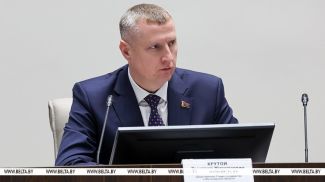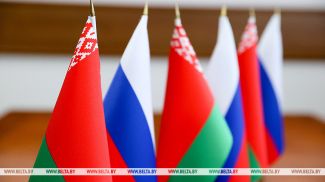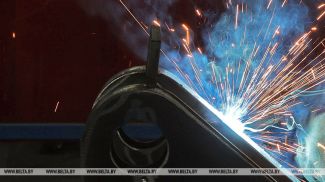
VITEBSK, 2 September (BelTA) – Light industry goods account for 16% of trade between Belarus and Uzbekistan, Chairperson of the Belarusian state light industry concern Bellegprom Tatiana Lugina told BelTA.
According to Tatiana Lugina, light industry goods make up 16% of trade between Belarus and Uzbekistan. “On average, light industry forms 18-20% of Uzbekistan's GDP. It is a developed complex. The third Belarus-Uzbekistan Women's Business Forum will once again allow us to align our positions and coordinate the plans and tasks that were set before, and of course, to set new ones,” she said.

Following the second Belarus-Uzbekistan Women's Business Forum, cooperation between the two countries in the industrial sector received a significant boost. For example, Orsha Linen Mill produced over 10,000 men's shirts based at one of the companies in Uzbekistan, the Bellegprom head said.


“The company specializes in sewing such garments, including for Hugo Boss, i.e. for well-known brands. By utilizing Uzbekistan's strengths, we plan to continue working in this direction. Our enterprises Kalinka, Slavyanka, and Svitanaк are also working very closely in industrial cooperation with Uzbekistan,” said Tatiana Lugina. In recent years, there has been good collaboration with state structures. Special-purpose clothing is being made in Uzbekistan using Belarusian fabrics.





As for trade, according to Tatiana Lugina, its format and mechanisms are changing. “We are used to working with Uzbekistan directly, but today we need to talk about developed marketplace platforms and e-commerce. These cannot be dismissed. E-commerce between Belarus and Uzbekistan is underdeveloped, so this is a separate topic for our discussion of what we need to do to get Belarusian goods to the country's market en masse. We specifically discussed this at the section “Light Industry: New Horizons of Cooperation between Belarus and Uzbekistan” of the third Belarus-Uzbekistan Women's Business Forum,” the Bellegprom head said.







According to Tatiana Lugina, over the past three years 69 Uzbek students have received diplomas of Vitebsk State Technological University. They studied in departments related to leather, footwear, and textiles. Currently, 17 Uzbek students are studying there. Uzbekistan also has a need to exchange labor resources, so Bellegprom plans to develop cooperation in this area as well.
“We want to strengthen the vector of cooperation in the leather and footwear industry. In textiles and the garment industry, we are already deeply integrated, we know each other, we know the strengths, but we still do not in what concerns leather and footwear,” Tatiana Lugina said.
Furthermore, the parties are working to establish joint production facilities. “Today we can see that the fashion vector has turned towards sheepskin. Sheepskin coats, motorcycle jackets, and other similar items are back in fashion. Fur and leather are often used in interiors, too. Therefore, Uzbekistan has a great opportunity in the production of these specific hides. As one option, we are discussing a joint venture. We talked about investments and financing possibilities,” the Bellegprom chairperson said.

According to Tatiana Lugina, it is important to talk not only about exports but also about imports. Approximately $14-15 million worth of cotton yarn enters the Belarusian market annually. 75% of this yarn is from Uzbekistan. “We are currently interested in cotton noil – these are cotton waste products that we want to use in one of our future projects,” she emphasized.
Tatiana Lugina believes that through such business forums, Belarus and Uzbekistan have grown closer and have not only started working together but have also become friends. “It's great when we can discuss not only business projects and ideas with a partner but also simply talk as people, discuss our countries and our families,” she added.
As part of the Uzbek delegation's visit to Belarus, following a meeting in an expanded format, Chairperson of the Council of the Republic Natalya Kochanova and Chairperson of the Senate of the Oliy Majlis of Uzbekistan Tanzila Narbaeva visited the Marko shoe factory. There, the delegation from Uzbekistan was shown a wide range of footwear and other achievements of the Belarusian light industry, for example, at a fur factory where the countries can cooperate in the processing of furs, leather, and products made from them.













